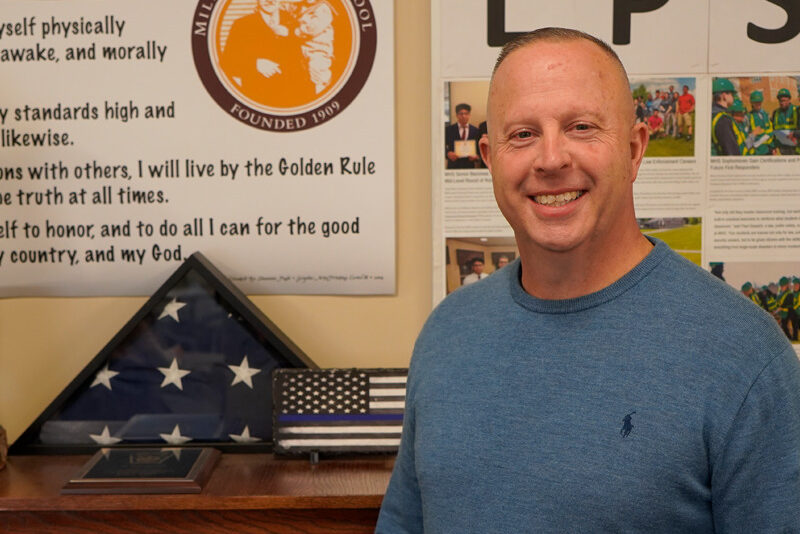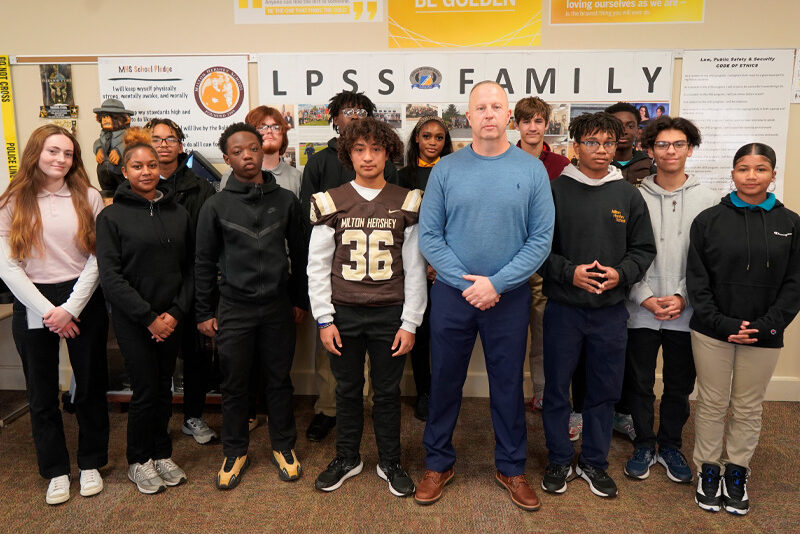Milton Hershey School Teacher Uses Army Lessons in Classroom
By Paul Gaspich, MHS Law, Public Safety and Security teacher
As I reflect on my life this Veterans Day, I realize I am so blessed and appreciative to be the Milton Hershey School Law, Public Safety and Security teacher. I knew my experiences in the United States Army would prepare me for my career as a Derry Township police officer and Pennsylvania State Police trooper, but I never realized how much those experiences would assist me in being an effective teacher at MHS.
Guided by values
The seven Core Values of the United States Army are Loyalty, Duty, Respect, Selfless Service, Honor, Integrity, and Personal Courage. These values resonate with me 35 years after three drill instructors instilled them in me at Fort Knox, Kentucky.
I strive to earn my students’ respect through my actions and demonstrate I truly care about them and their future. My job is to model professionalism and push them past their comfort zones so they can achieve their goals.
I aim to live the Army Core Values in everything I do, including how I raised my two amazing children who serve in the military. My daughter, Analyse, teaches at MHS Middle Division and serves as a First Lieutenant in the Pennsylvania Army National Guard. My son, Nicolas, is a Senior Airman in the Air Force and is currently deployed overseas and serves in the 193rd Special Operations Wing.
The MHS Sacred Values – Commitment to Mission, Integrity, Positive Spirit, and Mutual Respect – serve a similar purpose. I consistently tie our Sacred Values into daily lessons and conversations, so students remember to use them while navigating life’s trials and tribulations.
Importance of communication
Without detailed, clear, and specific communication to each member of the team, missions can fail. As a teacher, it is imperative I provide real-life meaning to each lesson. Students must understand why we are working so hard and how it will impact them now and in the future.
At MHS, we stress the importance of consistent and clear two-way communication. Students advocate for themselves in a professional manner without fear of reprisal. They are expected to utilize critical thinking skills to find information to support their advocacy. The Law, Public Safety and Security class gives students the opportunity to speak in front of their peers. They critique each other and provide positive feedback and, more importantly, constructive criticism. They hold each other accountable for their actions and classroom management.
Maintaining focus
Structure, self-discipline, and a “mission first, people always” mindset, which was forged in the military, allows me to focus on the important aspects of life. I embrace life with a positive mindset. I utilize that same mindset in my classroom, where students focus on the tasks at hand and mission completion.
In the military, you are pushed to mental, physical, and emotional limits. You learn to balance many tasks, pay attention to detail, persevere through difficult challenges, hold yourself to high standards, and work as a part of a team for the greater good.
Building a team
As a brand-new Army Platoon Leader deployed overseas, I learned to be responsible, not just for myself, but for the success or failure of others. I learned to put the team ahead of myself, to make sacrifices for the good of my platoon, and to work with people of diverse backgrounds, strengths, and abilities. I quickly learned humility is vital to mission success.
All this undoubtedly carried over to my teaching career. I strive to instill the same values in my students and teach them the skills necessary to build successful relationships so they can achieve their personal best. Creating this demanding learning environment helps students persevere through challenges. We build trust through group projects, presentations, mock trials, and practical skill training and certifications. By working so closely with each other, students gain new perspectives and opportunities to learn. As they realize they must put aside differences and distractions to work effectively as a team, they see value in each other. I love it when students who had never spoken to each other on campus leave my classroom as lifelong friends.
Valuing diversity and support
The United States military brings people from various cultural and ethnic differences together to serve a common purpose. I loved meeting and serving alongside people from various countries, states, backgrounds, cultures, and ethnicities, who believe in the ideals of freedom, equality, and a bright future. These experiences help me connect with my students in a more meaningful way because MHS is a very diverse school.
I spent months on end at training and two years deployed overseas, far away from my family support network. Those experiences help me empathize with MHS students about how difficult it is to be away from your support network and family. I strive to offer experiences that encourage students to build connections that contribute to their sense of well-being, self-confidence, and academic achievement.
Honoring our founder
Milton S. Hershey told Literary Digest in 1923 that “A man ought to work for what he gets. I was successful in business because I had opportunities. When the opportunities came, I took them.”
I am grateful for the opportunity to push my students using the lessons I learned in the United States Army and the values instilled in MHS by our founder, Mr. Hershey. Through those lessons and values, students can truly understand and appreciate the amazing opportunities MHS offers them. Hard work, communication, and teamwork will fully prepare them to take on the world as Spartans.
Read More about Student Character and Leadership


